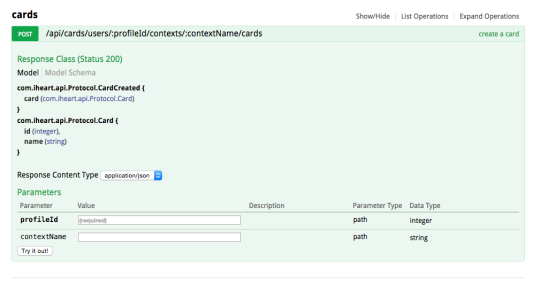I am pleased to release play-swagger - a Swagger spec generator for REST APIs built with Play Framework.
It generates swagger specs from play route files and case class reflections without the need for any code annotation.
The main principles we follow when designing this library are:
- No code pollution (e.g. annotation)
- DRY (extract as much information from the code as possible)
- When documenting an endpoint, it should be just swagger specification that you need to write. You shall not need to learn another API or spec format.
- Write your swagger specification in your routes files as comments (json or yml)
- Reference your case classes in your swagger spec and play-swagger will generate definitions
- Override anything in either the swagger spec in comment or the base swagger spec file.
Here is a simple example that demonstrates how iheart/play-swagger works.
In a
cards.routes which is referenced in routes as
-> /api/cards cards.Routes
###
# summary: create a card
# responses:
# 200:
# description: success
# schema:
# $ref:'#/definitions/com.iheart.api.Protocol.CardCreated'
###
POST /users/:profileId/contexts/:contextName/cards controllers.api.Cards.createCard(profileId: Int, contextName: Option[String])
package com.iheart.api
object Protocol {
case class CardCreated(card: Card)
case class Card(id: Int, name: String)
}

For more detail, please go to the project page: http://iheartradio.github.io/play-swagger/
Any feedback/contribution will be greatly appreciated!
No comments:
Post a Comment